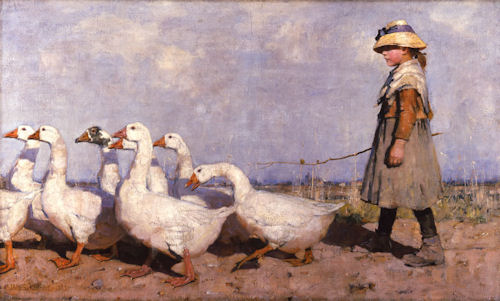




Dear Da —
Did you know something? We're moving again.
It begins with the sound of newspapers being crumpled as Lizzie Morrison wraps the family's meagre belongings and packs them into boxes, small cartons of a type and size that can be handled easily by one person.
Frankie, too, is seen admiring his various treasures before neatly placing them into a similar carton. With the assured competence of long experience, he tapes the box shut, writes his name Frankie Morrison, and under that Handle with care!!! We next see him holding the box as he enjoys a moment's sunshine outside on the front step. A cloud of smoke testifies that grandmother Nell is already installed on the front seat of the mostly-packed van.
We hear the continuation of Frankie's letter as he sits in trustful contentedness between his mother and grandmother as Lizzie drives the badly-damaged van along the winding roads of Scotland's countryside.
Ma says it's time. She says that it's definitely the last time. But she says that every single time.
Nana says that if there is a next time, she will have to be carried out in a box. And Ma says, don't tempt her. Nell is seen drawing on a cigarette with the desperation of a chain-smoker, before turning her head to smile fondly at Frankie.
And do you know something else, Da? This time ... This time we're living right on the edge of the sea ... right on the edge of the world. And through the van window we start to glimpse water, until they are driving on a road high above an ocean port.
We see the three of them momentarily in their new flat before Lizzie sends Frankie downstairs to the fish shop to buy a couple of fish suppers — and grandmother Nell pantomimes smoking as a wordless reminder not to forget her cigarettes.
In the fish shop we first become aware of Frankie as a child who neither hears nor speaks. Not by stressing the difficulties with which his path is strewn, but by showing the methods he has learned and been taught to spare others any discomfort.
Shop proprietor Marie is a marvel of film construction, as is Marie's, her shop. Frankie waits while a gaggle of giggling girls pays with a large pile of pennies which Marie begins to count methodically:—
...
One, two, three ...
— Ah, Marie, come on. Gie's a break.
... four ...
— Keep your hair on. It's a joke.
Right, you two. Beat it. And don't annoy me
for the rest of the week. OK? Right. Who's
next? Let's see. Right.
The girls take their leave noisily, leaving Frankie next in line alone at the counter. With all the confidence in the world he hands Marie a note, and watches critically as she reads it and begins to ladle lovely dark chips first onto one sparkling white container and then the next. At this point he knocks on the counter in a peremptory manner, mouthing the word more.
Your wish is my command, Marie answers good-naturedly. Just on the one? Aye. No bother. Right. And with great matter-of-factness she ensures that the extra chips in the second container are not contaminated by the unwanted presence of fish. And wrapping up the two white packages, she asks:— OK. Is that it?
It's only when Frankie pantomimes taking a drag on a cigarette and blowing out smoke that Marie is shaken from habitual matter-of-factness and decides she's dealing with a small rogue:—
How old are you? Frankie holds up five fingers of his left hand and four one by one beginning with the thumb on his right. Yeah, well, come back in six and a half years.
Back at the apartment a seriously displeased Nell points downward at the words down there as she chastises Frankie:—
...
Just you go back down there and
tell Madam Much that you want a packet of Embassy Regal.
And if she gives you any more of her lip, tell her I'll
come down and batter more than her fish.
— Are you that desperate? asks Lizzie,
a silly question to ask of a chain-smoker.
There is a long queue inside the shop as Lizzie comes in and stands at the cash between two men waiting for their orders.
...
Excuse me. Embassy Regal.
— There's a queue, replies
a seriously overworked Marie.
My boy's already queued. And before you ask,
I am so ...
— OK, hold your horses. I'll do you next.
A chorus of complaint breaks
out.
— She only wants a packet of fags.
What was the problem anyway? Could you not understand him?
— I understood him perfectly. He's a smart wee cookie.
For a deaf kid?
Marie
has turned away to the cash, turns back at this:
— For his age.
. . . . .
It may seem that I've given this scene far too much importance, but to me nothing would work in the film without a proper appreciation of Marie and her shop. And Lizzie's extreme suspicion even of the estimable Marie coupled with her morbid sensitivity to the disability of her child best demonstrate for us the difficulty of the life that Lizzie has chosen — or been forced — to lead.
________________________